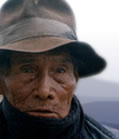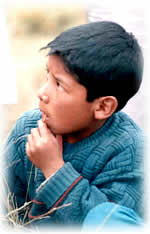 |
 |
||
 |
|||
|
RELATED THEMES development employment and income gender migration OTHER LOCAL THEMES BACKGROUND |
education
Generally, though, with farming in decline and local employment opportunities somewhat insecure, most parents lay great emphasis on their children's education, even when they know this will mean temporary or even permanent migration to Lima or other cities. Most say the sacrifice was worth it; others are less sure: "[Children today] don't help and they even forget that they have parents. Maybe it's the education they get. Before parents were stricter and had more authority, now they don't. Children are very selfish and only think about themselves. Education is like that, it makes them more selfish and so they no longer respect their parents. They go away and once in a while they return, that's all" (Peru13). Others warn of the problem of unfulfilled expectations: "The young people go to university with high expectations; they think they're going to become professionals and their parents have high expectations of them too, but in the end they come out and they end up working in whatever they can, despite the fact that they've studied. This is what happens and there's a lot of frustration" (Peru 15). Several stress the need for better higher education facilities in Cerro de Pasco itself, which would keep students there, and encourage job creation locally. The university is seen as out of touch with the people's needs and situation. A couple of people claim the presence of the mining company even dominates aspects of school and university teaching, which often avoid the topic of environmental pollution: ".we don't get any further in having a serious, comprehensive study of the issue which would cover education in the home to ensure the success of the anti-pollution campaigns and prevention. We have to find a way of getting over the overwhelming sense of resignation here. [officials such as] the Education Co-ordinator never do anything. To avoid confrontations with the company they shirk the issue.we should give [our environment] priority and establish the causes, effects and the possible alternatives, the feasible solutions, to bring in students and their parents" (Peru 32). quotes about education"When I was 12, a law was passed saying everyone must go to school. The police came and went from house to house looking for people who didn't send their children to school, those who hadn't enrolled that year." "The problem is we continue to be a forgotten area. Yes, this area is very much uncared for by the State. For example.the teachers that prepare classes for the children only teach three or four months a year and the rest of the time. they ask for leave. So what happens? Today the campesino sees his children are not being educated as well as they should be, so they feel they're wasting their time. [And if] there's no support for campesinos, the countryside is abandoned. there's no education, there's nothing, so why should the campesinos want their children to carry on in the countryside? They even go with their families to look for new opportunities in the cities." ".those who want to make themselves better have to leave La Oroya and come to Lima because there are universities here. Any youth who wants to improve himself has to leave by the time he is 16, 17. Since the majority want to go to university, they leave La Oroya, some of them to look for work. You could say that 80% to 85% leave La Oroya." "They used to say, what's the point in daughters studying when girls weren't going to contribute to the household...when they get married, they'd go on to serve their husband and his family - that's the way it used to be. It was different for the man... besides, women weren't going to contribute [economically].basically, it was machismo . But nowadays sons and daughters reach the same level. I guess there is an influence, very possibly from European culture... or perhaps it's the original culture of the region, very possibly ..." "The university was a product of the efforts of the mining unions in Cerro de Pasco, particularly the rail-workers union. Unfortunately [that relationship's] dead! Once the university was established it began to separate itself from the trade unions, that's why there's a demand now that our university - we say ours because in reality we all put in effort to bring it to fruition - develops a social perspective. I don't mean them to go out singing and dancing, or lighting fireworks. I mean they have to interpret the needs of the miners, the campesinos and the whole population here. Our university has never organised a debate on the issue of the privatisation of Centromin. That's why we say.they live on a private island, behind a great wall, maybe that's why they can't hear the workers' and the unions' complaints." ".despite the short time I was at the mine... I have caught pneumoconiosis... I have seen a lot of my workmates with severe occupational illnesses and they can't take care of themselves any more, or workmates that have.been handicapped. Before, my family - my father, my grandparents - would say, 'We have to maintain the mining blood in our family.'. I don't think that way. I don't want my children to go to the mines. I would like them to study. In short, let them do what they want to, but I frankly would not like them to go to the mines." |
|
 Education is one of the areas where there has been considerable change. Most of the older women say they had little opportunity for schooling - poverty ruled it out mostly, plus the widespread view that even if money was available, it wasn't worth educating a girl. Boys were the priority, since they were the future breadwinners and seen as likely to help their parents. One woman in her 40s says her grandmother paid for her to attend a few years of school until her
Education is one of the areas where there has been considerable change. Most of the older women say they had little opportunity for schooling - poverty ruled it out mostly, plus the widespread view that even if money was available, it wasn't worth educating a girl. Boys were the priority, since they were the future breadwinners and seen as likely to help their parents. One woman in her 40s says her grandmother paid for her to attend a few years of school until her